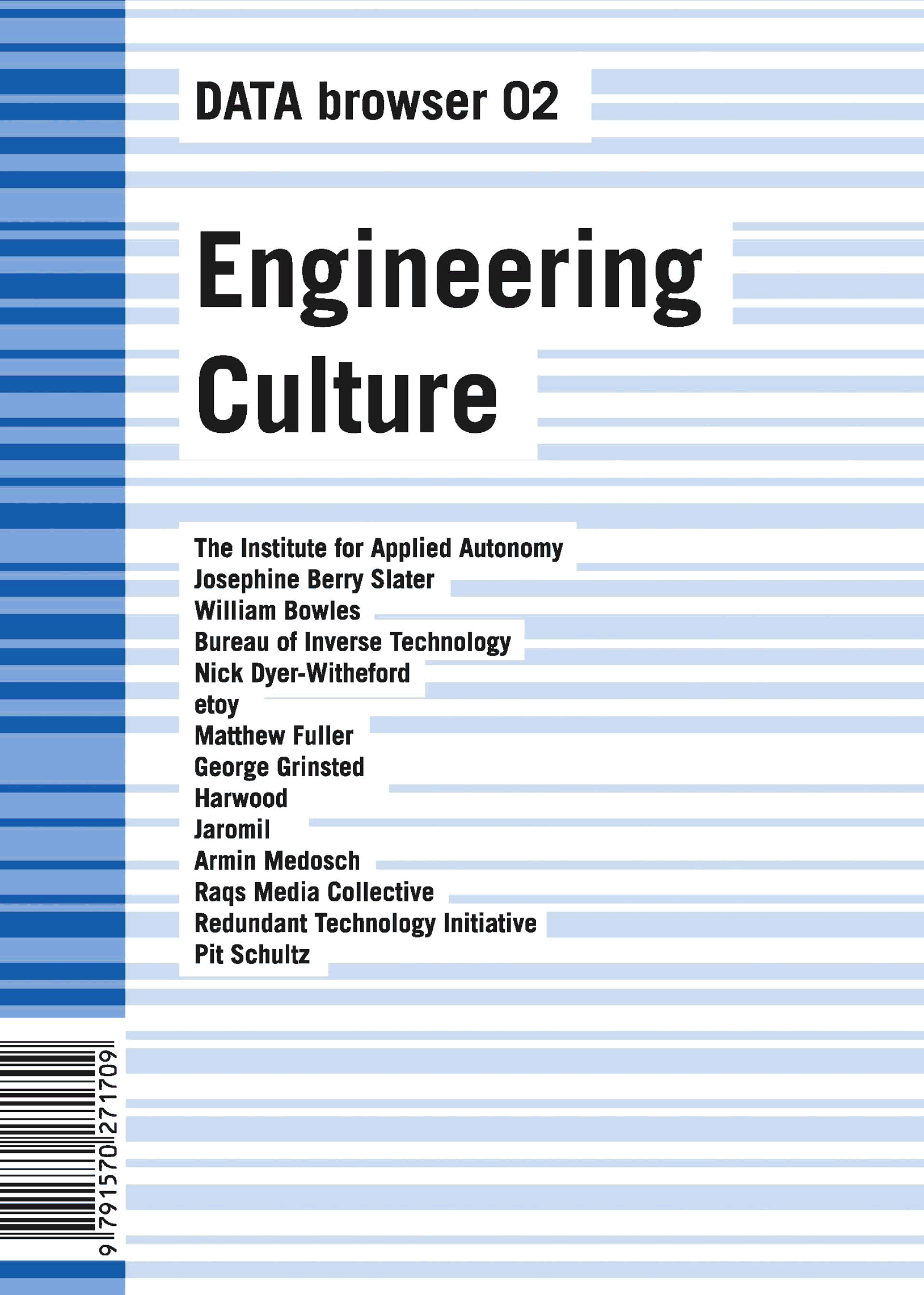Geoff Cox, Joasia Krysa (eds.): Engineering Culture: On ‘The Author as (Digital) Producer’ (2005)
Filed under book | Tags: · authorship, digital culture, engineering, production

“Social change does not simply result from resistance to the existing set of conditions but from adapting and transforming the technical apparatus itself. Walter Benjamin in his essay ‘The Author as Producer’, written in 1934, recommends that the ‘cultural producer’ intervene in the production process in the manner of an engineer. The term ‘engineer’ is to be taken broadly to refer to technical and cultural activity, through the application of knowledge for the management, control and use of power. To act as an engineer in this sense, is to use power productively to bring about change and for public utility. This collection of essays and examples of contemporary cultural practices asks if this general line of thinking retains relevance for cultural production at this point in time – when activities of production, consumption and circulation operate through complex global networks served by information technologies.”
Contributors: The Institute for Applied Autonomy | Josephine Berry Slater | William Bowles | Bureau of Inverse Technology | Nick Dyer-Witheford | etoy | Matthew Fuller | George Grinsted | Harwood | Jaromil | Armin Medosch | Raqs Media Collective | Redundant Technology Initiative | Pit Schultz.
Publisher Autonomedia, 2005
DATA browser series, 2
Creative Commons License
ISBN 1570271704
240 pages
PDF (9 MB, added on 2017-2-24)
PDFs (updated on 2016-12-12)
Geoff Cox, Joasia Krysa, Anya Lewin (eds.): Economising Culture: On ‘The (Digital) Culture Industry’ (2004)
Filed under book | Tags: · culture industry, digital culture, economy

“The interaction between culture and economy was famously explored by Theodor Adorno and Max Horkheimer by the term ‘Kulturindustrie’ (The Culture Industry) to describe the production of mass culture and power relations between capitalist producers and mass consumers. Their account is a bleak one, but one that appears to hold continuing relevance, despite being written in 1944. Today, the pervasiveness of network technologies has contributed to the further erosion of the rigid boundaries between high art, mass culture and the economy, resulting in new kinds of cultural production charged with contradictions. On the one hand, the culture industry appears to allow for resistant strategies using digital technologies, but on the other it operates in the service of capital in ever more complex ways. This publication, the first in the series, uses the concept of the culture industry as a point of departure, and tests its currency under new conditions.”
Contributors: Carbon Defense League & Conglomco Media Conglomeration | Adam Chmielewski | Jordan Crandall | Gameboyzz Orchestra | Marina Grzinic | Brian Holmes | Margarete Jahrmann | Esther Leslie | Marysia Lewandowska & Neil Cummings |Armin Medosch | Julian Priest & James Stevens | Raqs Media Collective | Mirko Tobias Schäfer | Jeremy Valentine | The Yes Men
Publisher: Autonomedia, 2004
DATA browser series, 1
Creative Commons License
ISBN 1570271682
256 pages
PDFs (updated on 2016-12-12)
Comment (0)Joe Karaganis (ed.): Structures of Participation in Digital Culture (2008)
Filed under book | Tags: · digital culture, participation, social science

Structures of Participation in Digital Culture, edited by SSRC Program Director Joe Karaganis, explores digital technologies that are engines of cultural innovation, from the virtualization of group networks and social identities to the digital convergence of textural and audio-visual media. User-centered content production, from Wikipedia to YouTube to Open Source, has become the emblem of this transformation, but the changes run deeper and wider than these novel organizational forms. Digital culture is also about the transformation of what it means to be a creator within a vast and growing reservoir of media, data, computational power, and communicative possibilities. We have few tools and models for understanding the power of databases, network representations, filtering techniques, digital rights management, and the other new architectures of agency and control. We have fewer accounts of how these new capacities transform our shared cultures, our understanding of them, and our capacities to act within them. Advancing that account is the goal of this volume.
Publisher The Social Science Research, New York, 2007
ISBN 0979077222, 9780979077227
284 pages
PDF (updated on 2013-6-6)
PDF (alt link, added on 2013-6-6)

